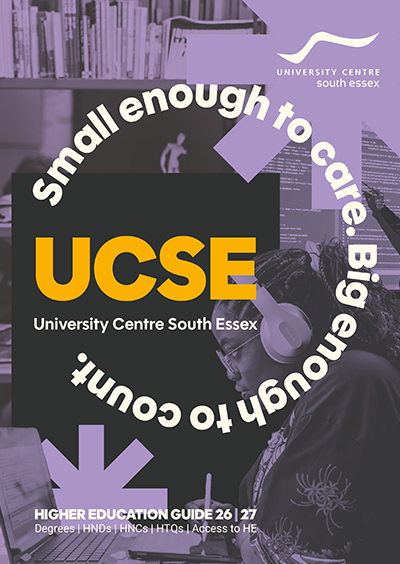Level 6
Photography BA (Hons)
| Duration | Age Group | Study | Start | Cost | Available Locations |
|---|---|---|---|---|---|
| 3 YEARS | ADULT | FULL TIME |
15/09/2026 |
£9,535 per year * | Southend Campus |
| 6 YEARS | ADULT | PART TIME DAY |
15/09/2026 |
£4,767 per year * | Southend Campus |
| Duration | Age Group | Study | Start | Cost | Available Locations |
|---|---|---|---|---|---|
| 3 YEARS | ADULT | FULL TIME |
15/09/2026 |
£9,535 per year * | Southend Campus |
| 6 YEARS | ADULT | PART TIME DAY |
15/09/2026 |
£4,767 per year * | Southend Campus |
Share On
Overview
Course code: W640
This course is validated by the University of the Arts London (UAL)
The BA (Hons) Photography course provides students with a broad knowledge and experience of photography and post-production techniques across a range of genres approaches and contexts, building knowledge and the experience required to become a confident and successful image maker within photography creative media and fine art. Photography is an exciting creative profession that is continually undergoing changes in response to significant technological developments and the resulting demands from both established and new emerging media that enable creative content to be widely distributed and consumed by a potentially vast audience.
The programme aim is to develop and refine distinctive aesthetics that will engage audiences who have increasingly sophisticated levels of visual literacy. Whilst on the programme you will engage with experienced lecturers who come from a wide range of creative and professional disciplines enabling you to increase your technical ability, expand your commercial cultural and critical understanding of the photographic world and most importantly enable you to develop your own personal ideas.
Entry Requirements
You will need a minimum of 64 UCAS points from one or more of the following:
- A Levels
- T Levels
- BTEC/UAL Extended Diploma
- Foundation Diploma in Art and Design (Level 3 or 4)
- Or equivalent EU/International qualifications such as International Baccalaureate Diploma
- Plus English GCSE passes at grade 4 or above (grade A*-C)
This list is not exhaustive other qualifications may be considered. Entry to this course will also be determined by the quality of your application looking primarily at your portfolio/showreel of work, personal statement and reference.
Applicants who do not meet these course entry requirements may still be considered in exceptional cases. The course team will consider each application that demonstrates additional strengths and alternative evidence.
Course Structure
Year One units (Level 4)
- Analogue Processes
- Theory as Practice 1
- Location
- Studio
- Moving Image
Year Two units (Level 5)
- Materials and Methods
- Student-Led Project
- Professional Development and Placement
- Live Brief
- Theory as Practice 2
Year Three units (Level 6)
- Theory as Practice 3
- Refinement of Photographic Intentions
- Subject Realisation
- Professional Development and Portfolio
Teaching & Learning
Contact hours: 13 hours per week. Plus Independent Study (suggested 30 hours per week)
You will use industry-standard equipment including darkrooms and photographic studios with professional software and be introduced to a wide range of camera and lighting equipment.
Assessment & Feedback
All assessment on the BA (Hons) Photography is via coursework; there are no exams.
Coursework is assessed in a range of different ways in order to accommodate a variety of learning styles and aptitudes.
You will receive on-going feedback as part of your one-to-one sessions with your unit teachers. You will also receive summative feedback on all formal assessments undertaken by coursework. Feedback is intended to help you learn and you are encouraged to discuss it with your unit leader. Feedback can be given in a range of different ways in order to accommodate a variety of learning styles and aptitudes including group critiques, recorded verbal feedback and written feedback.
Course Cost
Adult,
full_time:
£9,535 per year
Adult,
part_time_day:
£4,767 per year
Fees are per academic year for Home/UK students
The following course-related costs are included in the fees:
- Guest speakers, visiting lecturers and industry focussed workshops will be included in your course over the three years.
- Third Year students will have the opportunity to showcase their final year work at the end of their studies. This may be a local, national or online platform. Event/exhibition costs will be covered by the Faculty of HE. In the past this has included Free Range. Students will be responsible for any additional costs associated with the production of their personal project (ie: printing, materials).
- Annual £20 of printing credit per year.
Additional course costs can be found here
What Next...
Many of our graduates find employment as freelance or employed photographers, whilst some choose to continue their studies at post-graduate (Masters) level.
Placements and live briefs. Students have engaged with many opportunities including:
West Ham United, Volvo GB, Vintage and Classic Car Hire, Daisy Whittaker Designs and The Back Stage Centre.
Recent Graduate destinations include:
Equestrian Photography at the Badminton Horse Trials, Wedding Photography, Main Media Video and Bad Wolf for BBC with Doctor Who.
Other Graduate destinations could include:
- Photographic assistant
- Commercial photographer
- Videographer
- Image editor
- Photographic printer
- Curation
- Contemporary film maker
- Photographic stylist
- Writer

